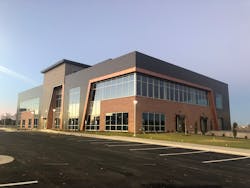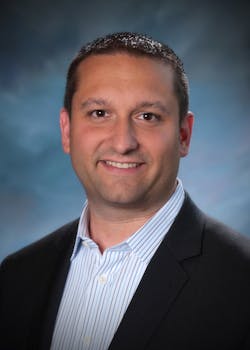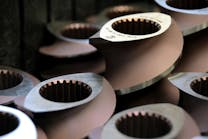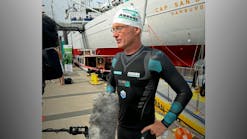Deloitte and Wichita State University are joining forces to build “a groundbreaking and immersive experiential learning environment” on the school’s Innovation Campus.
Deloitte, which provides consulting services to businesses, is working with more than 20 other organizations and innovators to build the new facility, which will include a full-scale production line, dedicated space for what Deloitte calls “ecosystem sponsors” and experiential labs exploring smart factory capabilities. The facility is scheduled to open in early 2022.
A smart factory is a highly digitized and connected production facility that uses technologies including artificial intelligence, Internet of Things and robotics to autonomously optimize manufacturing operations. The Smart Factory @ Wichita will demonstrate how existing technologies can be merged with new innovations, sparking a dialogue about how companies can accelerate their transition to smart manufacturing.
“The goal is to help manufacturers understand the benefits of smart factories and how to get started,” according to a statement provided by John Tomblin, senior vice president for industry and defense programs at Wichita State University, and Stephen Laaper, a principal at Deloitte Consulting LLP and smart operations leader in Deloitte’s Supply Chain & Network Operations practice. “The Smart Factory @ Wichita is the living embodiment of manufacturing excellence, bringing together a world-renowned team of business leaders, solution providers, technology innovators, academic researchers and futurists to showcase how a smart factory can transform an entire enterprise.”
There are several reasons Deloitte decided to partner with Wichita State University and numerous sponsors to build the smart factory.
“First, there is the university itself with tremendous, talented faculty and staff to work with,” Laaper said. “In addition, WSU is making a significant investment in developing an innovation campus, partnering with many prominent companies, and this is where Deloitte is building our smart factory experience center [the Smart Factory @ Wichita]. Second, Wichita is a significant manufacturing hub, particularly in aerospace, providing a rich talent pool for the smart factory.”
The Smart Factory @ Wichita will be a true manufacturing plant producing a customized version of the Elenco Snap Circuits Rover kits for educational radio-controlled vehicles. Elenco is one of the leading manufacturers and distributors of educational STEM toys and do-it-yourself kits. Visitors can take a kit as a memento from a visit or donate a kit to a local school to support STEM education. None of the kits will be sold, and any kits that are not taken by clients will be donated to local schools, according to Deloitte.
“We will absolutely be showcasing plastic processing in the plant,” Laaper said. “We have a hopper train and extruder that will produce customized bodies for the Snap Circuit Rovers. We will also be using 100 percent recycled PET to produce the parts.”
In addition, a number of “ecosystem partners” will be showcasing their smart factory capabilities, he said.
The Smart Factory @ Wichita will offer numerous benefits to plastics processors and others wanting to learn about smart factory technologies, Laaper said. The 60,000-square-foot facility will have injection molding, blending and drying equipment. It also will include a variety of 3-D printers. The smart factory additive manufacturing capabilities will range from standard plastic filament printing all the way through FAA-certified steel printing.
“Educating manufacturers about what smart factories are is certainly a benefit, but it’s also about educating the future workforce through applied learning in the smart factory,” Laaper said. “For plastics processors, and really any company, there is the opportunity to collaborate with WSU faculty and students, a vast ecosystem of partners, and Deloitte to develop new use cases.”
The Smart Factory @ Wichita will demonstrate a wide range of technologies to optimize a factory floor, using IoT (Internet of Things), AR (augmented reality) and sensor-enabled monitoring that can predict equipment issues before they happen to reduce unplanned downtime and identify underutilized capacity, according to Deloitte and WSU.
The Smart Factory @ Wichita also will show how smart warehouse tools, including AR, automated conveyance and cognitive dispatching, can improve storage, accelerate shipping and right-size inventory levels.
Cognitive dispatching is using real-time data combined with both planned and historical data to schedule production orders, assets, tools and personnel to optimize throughput. Many manufacturers still use intuition and spreadsheets for planning with a significant margin of error, according to Deloitte. Today, it’s possible to use data and analytics to continuously optimize constraints such as asset, material and labor availability.
Automated guided vehicles (AGVs) and mobile equipment routing will ensure the right material makes it to the right place at the right time, while providing traceability. Routing of the AGVs, for example from the maintenance shop to an asset that is under repair with the necessary spare parts, eliminates waste and increases the efficiency of the worker, such as increasing time-on-tool, according to Deloitte.
Digital-twin simulation software will demonstrate how real-world variables can help perfect product designs, production processes and forecasts.
Environmental monitoring, motion sensors, microclimate controllers, artificial intelligence and machine learning detection will optimize energy levels and reduce overhead costs.
Vision systems, smart sensors and real-time analytics will accelerate product quality inspections, while automation, including robots and collaborative robots, will “drive better outcomes and increase safety,” according to Deloitte and WSU.
Bruce Geiselman, senior staff reporter
Contact:
The Smart Factory @ Wichita, Wichita, Kan., email at info@thesmartfactory.io, www.thesmartfactory.io/
Bruce Geiselman | Senior Staff Reporter
Senior Staff Reporter Bruce Geiselman covers extrusion, blow molding, additive manufacturing, automation and end markets including automotive and packaging. He also writes features, including In Other Words and Problem Solved, for Plastics Machinery & Manufacturing, Plastics Recycling and The Journal of Blow Molding. He has extensive experience in daily and magazine journalism.







